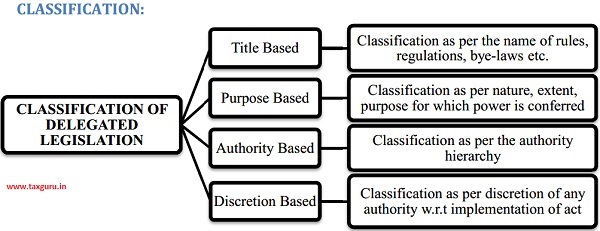Ahmedabad
(Head Office)Address : 506, 3rd EYE THREE (III), Opp. Induben Khakhrawala, Girish Cold Drink Cross Road, CG Road, Navrangpura, Ahmedabad, 380009.
Mobile : 8469231587 / 9586028957
Telephone : 079-40098991
E-mail: dics.upsc@gmail.com

Delegated Legislation
News: In upholding the Centre’s 2016 decision on demonetisation, one of the key questions to decide for the Supreme Court was whether Parliament gave excessive powers to the Centre under the law to demonetise currency.
• While the majority ruling upheld the validity of the delegated legislation, the dissenting verdict noted that excessive delegation of power is arbitrary.
What is Delegated Legislation?
• Parliament routinely delegates certain functions to authorities established by law since every aspect cannot be dealt with directly by the law makers themselves. This delegation of powers is noted in statutes, which are commonly referred to as delegated legislations.
• The delegated legislation would specify operational details, giving power to those executing the details. Regulations and by-laws under legislations are classic examples of delegated legislation.
What was delegation of power in the Demonetisation case?
• Section 26(2) of the Reserve Bank of India Act, 1934 essentially gives powers to the Centre to notify that a particular denomination of currency ceases to be legal tender.
• Here, Parliament, which enacted the RBI Act, is essentially delegating the power to alter the nature of legal tender to the central government. The Centre exercised that power by issuing a gazette notification, which is essentially the legislative basis for the demonetisation exercise.
Why was it challenged?
• The petitioner’s challenge was this: “In the event that Section 26(2) is held to permit demonetization, does it suffer from excessive delegation of legislative power thereby rendering it ultra vires the Constitution?”
• The Constitution gives law-making powers to the Parliament. While operational aspects can be delegated to statutory bodies, essential powers cannot be delegated. Also, the delegation must be with sufficient guidelines on how the power can be used.
• The petitioners in the demonetisation case argued that since Section 26(2) contains no policy guidelines on how the Centre can exercise its powers, it is arbitrary and therefore, unconstitutional.
Why is excessive delegation power an issue?
• A 1959 landmark ruling in Hamdard Dawakhana v Union of India, the Supreme Court had struck down delegation of powers on the grounds that it was vague.
• The Court applies the “policy and guideline” test to decide the constitutionality of the delegated legislation.
• The Attorney General for India argued that the RBI Act itself has guidance for exercise of delegated powers. He cited the Preamble and Section 3 of the Act as guidance on the purpose of the law and the Centre’s role in “regulating” monetary policy. Section 3 deals with establishment and incorporation of Reserve Bank.
What did the court decide?
• The majority verdict held that since the delegation of power is to the Centre which is anyway answerable to the Parliament, the delegation power cannot be struck down.
• The dissenting opinion, however, disagreed with this view. First, Justice BV Nagarathna held that Centre could not have exercised its delegated powers because Section 26(2) of the RBI only gives powers to the Centre when the recommendation is “initiated” by the RBI Central Board.
• The dissenting view also held that, even if the Centre has the power under Section 26(2) allowing for demonetisation of “any” notes is a vast power that is arbitrary and therefore unconstitutional.
Conclusion:
• Justice Nagarathna emphasised that demonetisation of all series of notes, at the instance of the central government, is far more serious than the demonetisation of particular series by the bank, mandating the need for a legislation as opposed to an executive action.

Address : 506, 3rd EYE THREE (III), Opp. Induben Khakhrawala, Girish Cold Drink Cross Road, CG Road, Navrangpura, Ahmedabad, 380009.
Mobile : 8469231587 / 9586028957
Telephone : 079-40098991
E-mail: dics.upsc@gmail.com
Address: A-306, The Landmark, Urjanagar-1, Opp. Spicy Street, Kudasan – Por Road, Kudasan, Gandhinagar – 382421
Mobile : 9723832444 / 9723932444
E-mail: dics.gnagar@gmail.com
Address: 2nd Floor, 9 Shivali Society, L&T Circle, opp. Ratri Bazar, Karelibaugh, Vadodara, 390018
Mobile : 9725692037 / 9725692054
E-mail: dics.vadodara@gmail.com
Address: 403, Raj Victoria, Opp. Pal Walkway, Near Galaxy Circle, Pal, Surat-394510
Mobile : 8401031583 / 8401031587
E-mail: dics.surat@gmail.com
Address: 303,305 K 158 Complex Above Magson, Sindhubhavan Road Ahmedabad-380059
Mobile : 9974751177 / 8469231587
E-mail: dicssbr@gmail.com
Address: 57/17, 2nd Floor, Old Rajinder Nagar Market, Bada Bazaar Marg, Delhi-60
Mobile : 9104830862 / 9104830865
E-mail: dics.newdelhi@gmail.com